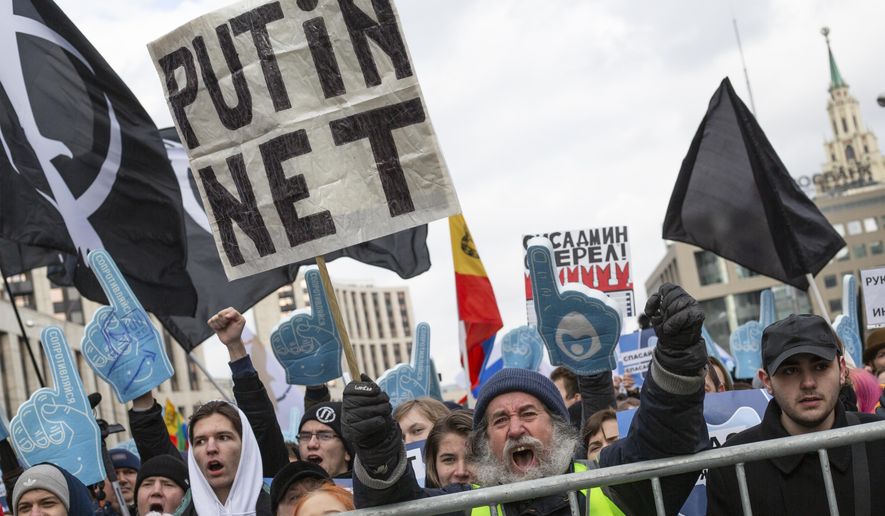OPINION:
After the unexpected resignation this week of Kazakh President Nursultan Nazerbaev, his chosen replacement, Senate Chairman Kassym-Jomart Tokayev, proposed renaming the capital city of Astana. The new name is — wait for it — “Nursultan.”
That inspired a joke that made the rounds on Russian social media: “I hope I don’t come home to Moscow and it’s been renamed ‘Vladimir City!’”
Another Facebook poster remarked, “I live in St. Petersburg, and I’m scared it’s now going to be called St. Putinburg.”
The jokes are funny, but the situation inside Russia is getting scary.
Since the collapse of oil prices in 2014 and the Western sanctions over Russia’s annexation of Crimea and Moscow’s support of separatists battling Kiev in eastern Ukraine, ordinary Russians have seen their incomes dwindle as the ruble went south and inflation headed north. The crisis has been only slightly eased in recent years due to competent monetary policy from the Russian central bank.
Russians are used to enduring such hardships. Suffering is an art form in this part of the world, as long as the country’s rulers can make the case that the sacrifices are being made for the greater good of Mother Russia. When that narrative falls apart, however — watch out.
What is scaring the Russian population now is the return of repression and censorship. The occasional death of a journalist or opposition figure has long been the norm in Vladimir Putin’s Russia. In those cases, voters could always say that the victims simply pushed too hard and “brought it on themselves.” It wasn’t personal.
This time, however, it is.
Over the last several years, many laws have been passed which restrict personal freedom. Campaigns against “extremism” have been used to stifle speech the Kremlin doesn’t like. There are too many Russians in jail charged with posting something offensive on Facebook or other social media outlets.
The recent push to shut off the Russian internet from the rest of the world, reminiscent of the Chinese model of repression, has scared Russians. Some 15,000 people demonstrated in Moscow last week against these measures. The Kremlin is forcing internet and social media providers to host their content on Russian soil and are shutting down those who fail to comply. The campaign against the popular (Russian-developed) encrypted texting app Telegram has further unnerved ordinary citizens.
That was all bad enough, but the measures President Vladimir Putin signed last week, making it a crime for anyone or any entity to “disrespect” the government, seems to have pushed many over the edge. Russians have grown used to internet freedom; it will be difficult to put that genie back in the bottle.
“The internet is the last form of protest we have, now they are shutting it down,” said one post on Twitter from Moscow.
Multiple arrests of Americans have chilled the tourist climate, while scaring off foreign investors as well.
The most disturbing aspect of this recent wave of oppression is the excuse Russian leaders have used to justify it — “They are doing this in the West,” Mr. Putin and his allies note. “Why can’t we do it here?”
There’s no need to go into all the examples of censorship and repression that are going on in the United States and the West. The recent blocking of certain URLs in New Zealand to “protect the population” in the wake of the mass mosque shooting is a disgusting use of technology for corrupt totalitarian reasons.
Unfortunately, it is probably too late for internet freedom in Moscow. In order to deal with the creeping repression across Russia, Russians are just leaving for the West.
But as things deteriorate here, we have to ask: Where are we going to go?
• L. Todd Wood is a former special operations helicopter pilot and Wall Street debt trader, and has contributed to Fox Business, The Moscow Times, National Review, the New York Post and many other publications. He can be reached through his website, LToddWood.com.




Please read our comment policy before commenting.